There are many ways to store birdseed. You can put it in a big plastic bin in your garage, a giant Ziploc bag in your kitchen cupboard, a birdseed dispenser beside the feeders, or just keep it in its...
There are many ways to store birdseed. You can put it in a big plastic bin in your garage, a giant Ziploc bag in your kitchen cupboard, a birdseed dispenser beside the feeders, or just keep it in its original packaging in the shed. But which is the best way to contain and store the food?
The best way to store birdseed depends on how much you want to store and where you want to store it. However, you can’t go wrong with a galvanized metal trash can with a locking lid stored in a cool part of your garage.
I’ve been backyard birding for years and have probably purchased hundreds of pounds of birdseed. One year mice breached my container and another year I had bugs flying out of it! These costly (and nasty) events motivated me to find the best way to store birdseed so I could enjoy feeding the birds without worry.
In this article, we’ll explore different types of containers for storing birdseed, ensuring it stays fresh and pest-free. We’ll also discuss the pros and cons of each, including their resistance to common pests like mice, squirrels, and raccoons.
Where to store the seed is just as important – we’ll get into that too!
Let’s dive into the world of birdseed storage!
Criteria for the Best Bird Seed Storage Containers
There are 2 main criteria for good bird seed storage.
Your container should have a tight seal to keep the seed fresh and to keep pests out. It should also be convenient for retrieving seed when it’s time to fill your feeders. If you’re buying seed in bulk or using different kinds of seed, using multiple containers can be helpful.Let’s explore the different types of containers to determine their worthiness for storing bird food.
Metal Containers
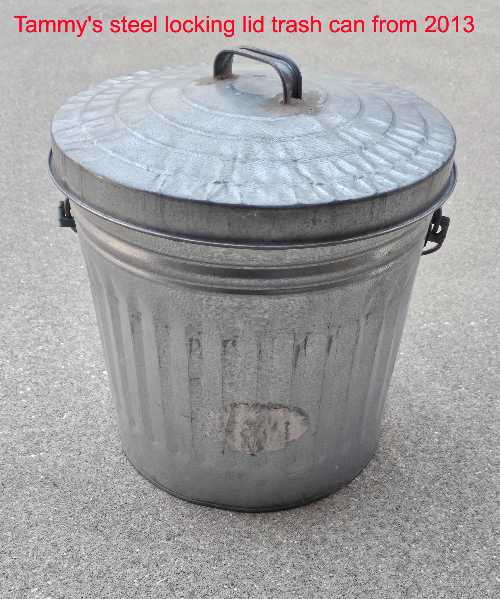
Galvanized metal storage containers with locking lids are perfect for storing seeds outside. In fact, this is my preferred option. I’ve been using the Behrens 6 Gallon Steel Locking Lid Can for almost 10 years and it’s still going strong.
Pros
The lid is tightly sealed to keep the food fresh and dry. Strong enough to prevent rodents from chewing through. Stores a large amount of birdseed so you can buy in bulk and save money. Galvanization ensures it won’t rust.Cons
More expensive than plastic and glass. Can be heavy (especially when filled) so moving it will be a challenge.A DIY alternative is using a recycled metal popcorn container.
Plastic Containers
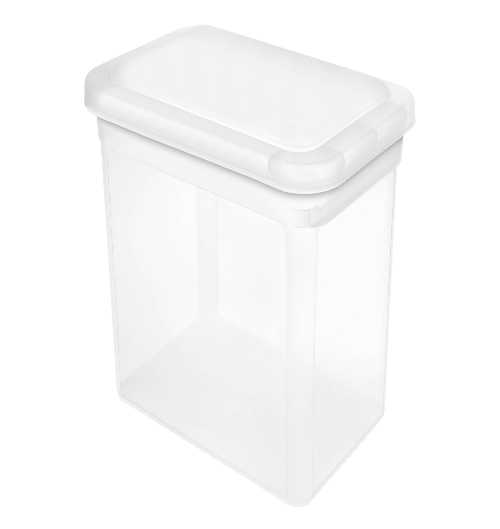
Plastic food storage containers are perfect for keeping smaller amounts of bird seed inside the house. However, they’re not ideal for outside use because of pests like squirrels, raccoons, and rodents. Rodents can easily chew plastic.
In fact, we used to store seed in a Rubbermaid tote in the garage and the mice chewed a hole right through!
Pros
Inexpensive (may even have some around the house). Not very heavy, even when filled with seed.Cons
Limited storage capacity Not resistant to chewing rodents (which is why we don’t recommend storing plastic outside).Glass Containers
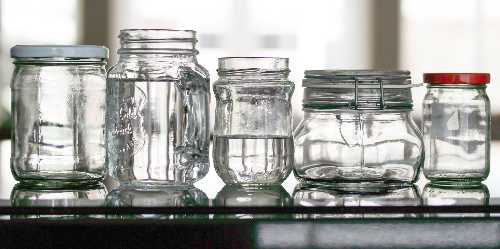
Glass canning jars are also good for storing small amounts of seed indoors. Keep in mind, that while glass containers are cheap, they are fragile. If you drop a glass container it could shatter ruining your seed (not to mention you now have a huge mess to clean up).
Pros
Inexpensive (may even have some around the house). Resistant to rodents and other chewing varmints (which shouldn’t be a problem when stored indoors).Cons
Easily breakable rendering the birdseed unusable if dropped. Can get rather heavy, especially after being filled with seed. Limited storage capacity.Tip: If you opt for canning jars, swap out the metal rings and inserts for a plastic screw top. It’s a more convenient way of dispensing the seed.
Pet Food Containers
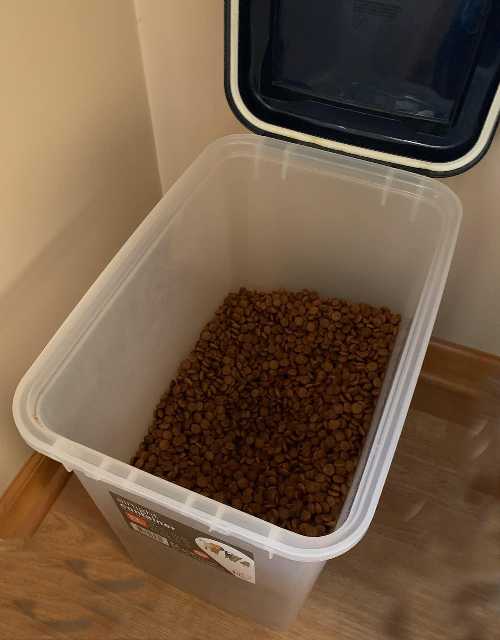
For bulk indoor storage, pet food containers are a good alternative to metal containers.
They often come with wheels which makes for easy transport. You can also get these containers in all sorts of sizes, making them perfect for any amount of seed.
They’re not rodent chew-proof so not recommended for outdoor use.
Pros
Easy to transport (containers on wheels). Relatively light (compared to metal and glass containers)Cons
More expensive than plastic or glass. Depending on the size, can be bulky taking up space in the home.Trash Cans
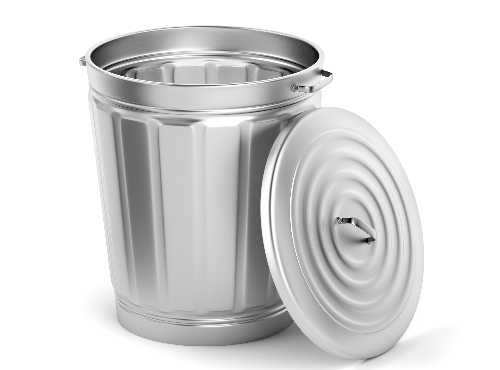
Last but not least, a metal trash can allows you to store your seed in bulk outside with little fear of pests.
Does it look familiar? It’s nearly identical to the galvanized metal can with the locking lid I mentioned above. The only difference is a standard metal trash can does not have a locking lid. Still, many have a tight-fitting lid so are still very viable options.
I don’t recommend plastic garbage cans because rodents and other pests can easily chew through the material.
Pros
The lid is tightly sealed to keep the food fresh and dry. Strong enough to prevent rodents from chewing through. Stores a large amount of birdseed so you can buy in bulk and save money. Many trash cans are galvanized to prevent rust.Cons
More expensive than plastic and glass. Can be heavy (especially when filled) so moving it will be a challenge.Summary of Container Types
Below is a summary of the container types and corresponding amount of birdseed to store along with the storage location.
| Metal | Large | Outside |
| Plastic | Small | Inside |
| Glass | Small | Inside |
| Pet Food Container | Large | Inside |
| Trash Can | Large | Outside |
Choose The Right Container
Now that you know about the different container types, which one will you choose? I created quick reference tables to help you choose the right container. Click on the title to reveal the table.
| Inside | • Plastic • Glass | Small |
| Inside | • Pet Food Container | Large |
| Outside | • Metal • Trash Can | Large |
Reference the table below to quickly determine the type of container to use based on how much seed you need to store and where to store that container (inside or outside)
| Large | • Metal • Trash Can | Outside |
| Large | • Pet Food Container | Inside |
| Small | • Plastic • Glass | Inside |
Tips for Storing Bird Seed Based on Quantity
Large Quantities
When storing seeds in large quantities, it can be difficult to transport. Use a container with wheels for easier movement. Or, buy a smaller container you can use as a scoop for when you’re replenishing your feeders.
Also, always make sure the lid is secured, especially when storing outside. A large quantity of tasty treats will be very tempting for pests.
Small Quantities
Storing bird seed in smaller quantities makes it easier to transport, and to keep from going bad. This is ideal for casual hobbyists who don’t keep much seed on hand.
Be sure to use airtight lids and store your containers somewhere where rodents and other critters won’t get at them.
Smaller quantities of seed are also easier to freeze and take out when you’re ready to use.
How to Store Different Types of Birdseed
Your choice of seeds has minimal impact on the storage approach. Sunflower (including black oil), nyjer, safflower, and seed mixes can all be stored in the same manner.
If you’re using different kinds of seed, consider buying multiple containers and labeling them accordingly.
How to Store Suet
While you can treat all seeds the same, suet needs special attention. Assuming your suet contains actual suet (the hard fat about the kidneys and loins in beef and mutton that yields tallow), they should be kept in the refrigerator or freezer to avoid becoming rancid.
Best Practices for Bird Seed Storage
How to Keep Birdseed Fresh
You’ll want to keep seeds in a dry, cool place in a container with a tight lid to keep them as fresh as possible.
If it’s stored properly, your seed should last for up to a year. When topping up your containers, be sure to rotate your stores so you’re using up all the old seeds first!
You can also freeze the seed to keep it fresh for longer. This is especially useful if you live in a humid environment where it can quickly spoil outside. Keep in mind this will only work well with smaller portions of seed.
Location
If you’re going to store birdseed indoors, make sure it’s somewhere dry and cool like a pantry. Consider freezing it to keep it fresh if you have the space.
Many homes are too warm to store seeds, so keeping them outdoors is often a good option. Keeping it in the shed or under an awning will help keep it protected from the elements.
Storing seed in your garage offers the best of both worlds. It will be protected from the elements, while still staying cool.
Cleanliness
Be sure to wash out your seed containers every time you add a new bag of seeds to keep the food as clean and fresh as possible. A simple water wash and thorough drying of the container will do.
Avoiding Insects & Rodents
The best way to keep bugs out of your bird seed is to store it with secure lids in a cool environment. Storing them in the freezer is also a surefire way to keep the bugs away.
The best choice for keeping rodents at bay is in a proper storage container like a metal container with a tight-fitting lid. Poorly stored seed can introduce rodents into your home, so you’ll want to take extra care when keeping seed indoors or in your garage.
Safety Concerns
If bird seed is moldy, smells off, or has any bugs in it – it has gone bad. Throw it away! Do not feed bad seed to birds because it can get them sick if ingested.
Buying lots of seed at once increases the chance of it going bad before you can use it all. So, only buy as much seed as you’ll be sure to use over a couple of months unless you have the ability to freeze it.
FAQ
Should you freeze birdseed?
Freezing bird seed is a great way to keep seed fresh and pest-free! If you bought more seed than you’re able to use before it spoils, freezing seed is a great option. Freezing is also useful for humid environments where seeds can quickly go bad.
Should I store bird seed in the plastic bag it comes in?
While you can keep seeds in the bag they come in, you should still put the bag in a tightly sealed container. Leaving seed out in just the bag will increase the chance of it spoiling or getting ruined by pests.
What are the little black bugs in my birdseed?
While any number of insects can infect bird seed, the little black bugs in your seed are most likely weevils. If any insects have gotten into your seed, throw out the batch to prevent the bugs from becoming a bigger problem in your home. Following the steps in this article should give you better luck keeping pests at bay!
Next Steps
Proper birdseed storage is crucial for keeping your feathered friends happy and healthy. Whether you opt for metal, plastic, glass, pet food containers, or even trash cans, the key is to choose a container that offers a tight seal to keep seeds fresh and safe from pests.
Remember to consider the quantity of seed you’re storing and the specific needs of different seed types, like suet. By following best practices, you can ensure that your birdseed stays fresh, pest-free, and ready for your bird feeders.
It’s also important to maintain cleanliness and safety in your birdseed storage. Regularly cleaning containers and being vigilant about the condition of your seed can prevent mold, pests, and diseases among birds.
Storing your birdseed in a dry, cool place, possibly freezing small quantities, and using containers with secure lids are all part of keeping your birdseed in top condition. With these tips and tricks, you’re all set to provide a delightful dining experience for your backyard birds, all year round.
Are you looking for a high-quality container for your seed? I highly recommend the Behrens 6 Gallon Rust-Proof Steel Locking Lid Trash Can. It’s what I used to keep my bird food fresh and pest-free.
Any questions, or concerns? Let us know in the comments below!







